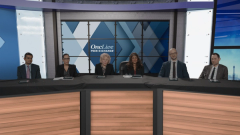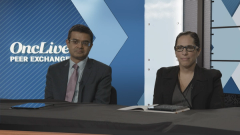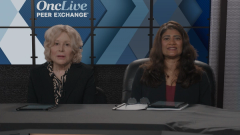
Venetoclax + Second Generation BTKi Combination Therapy in R/R CLL
Clinical trial updates evaluating the combination of venetoclax with second-generation BTK inhibitors acalabrutinib and zanabrutinib, respectively.
Episodes in this series

Transcript:
Sonali M. Smith, MD: We’ve been talking about ibrutinib, but earlier we discussed some of the toxicities associated with ibrutinib, and perhaps 1 of the second-generation BTK [Bruton tyrosine kinase] inhibitors could be tested with the BCL2 inhibition. I’m going to ask Ryan to comment on zanubrutinib and venetoclax in treatment-naïve CLL [chronic lymphocytic leukemia].
Ryan W. Jacobs, MD: Intuition tells us we could probably use 1 of the other more selective second-generation BTK inhibitors with venetoclax and also see an efficacious combination that might have even improved safety. Luckily, with these regimens, we’re cutting down the period of time that patients are on the BTK inhibitor as part of the design. The differences in toxicities might be a lot more subtle when comparing these time-defined BTK regimens than when comparing the long-term single-agent administration until progression or unacceptable toxicity.
The SEQUOIA trial looked at a few things, but it had an arm D that was the combination of zanubrutinib and venetoclax, specifically in a high-risk patient population. Those patients were previously untreated but had a chromosome 17p aberration. In terms of what’s been reported, the trial’s accrual has not been fully met, but we’ve had about half the patient data reported. It looks like great efficacy, and essentially all the patients responded. It’s too short of a follow-up to comment on any long-term outcomes, but it’s good to know that even in this high-risk patient population, that the BTK-BCL2 combination seems to be efficacious. That mirrors what we see in the MRD [minimal residual disease] cohort of the CAPTIVATE study, which looked at high-risk patients in that group.
Sonali M. Smith, MD: Nicole, what about acalabrutinib with venetoclax?
Nicole Lamanna, MD: Similarly, as we’re substituting the newer BTK inhibitors in combination with venetoclax to look at a time-limited approach, a lot of studies are going on with acalabrutinib. One is the MAJIC study. Most of these lead in with the BTK inhibitor to debulk and make it easier for venetoclax usage. Most studies have a 3-month lead-in with the BTK inhibitor. In this case, it was acalabrutinib, and then they start the venetoclax and usually go on for 12 months of combination therapy. This study is acalabrutinib-venetoclax vs venetoclax-obinutuzumab, which also will be given for 12 months, and then all patients will be looked at for MRD status at that time period. If they’re MRD negative, they’re done with therapy. If they’re MRD positive, if they’re on the AV [acalabrutinib, venetoclax] arm, they’ll continue for another 12 months. If they’re on venetoclax-obinutuzumab and have MRD positivity, they’ll continue venetoclax monotherapy for 24 months. All patients will be discontinued off therapy at 24 months, regardless. They’ll look at MRD and follow up. This is a very young study. There are other acalabrutinib-venetoclax studies. There’s AV [acalabrutinib, venetoclax] vs acalabrutinib vs FCR [fludarabine, cyclophosphamide, rituximab]. Those are maturing data
Transcript edited for clarity.








































